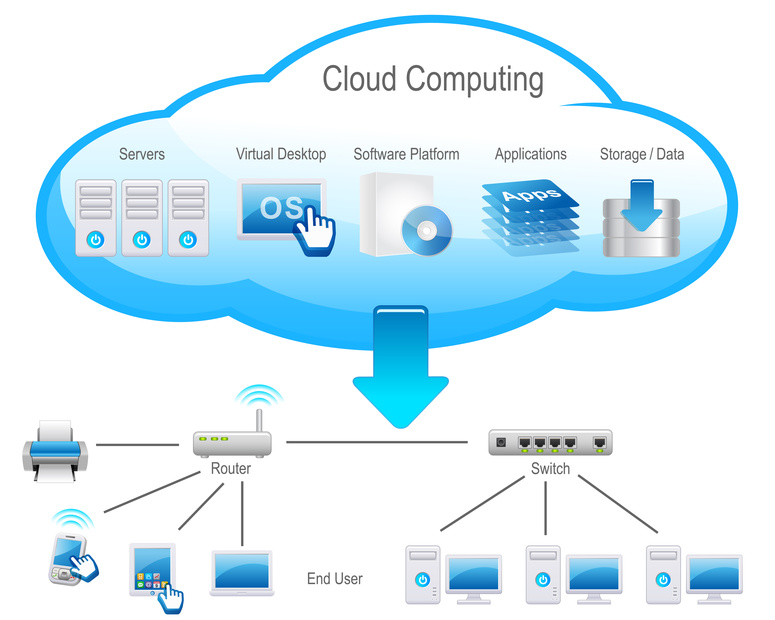Choosing a cloud service provider is much like buying a car. You want a car that will keep your family safe in case of an accident, will offer a smooth, stress-free ride, and is ideal for your transportation needs. Similarly with a cloud service provider, you also want to keep your files safe, enjoy the ease of use, and ensure that the services fit your needs.
You wouldn’t walk into a car dealership, close your eyes, point to a car, and drive away with that one, would you? Don’t do that with a cloud service provider, either. Make sure the service fits your needs before you settle. The cloud computing stack can be quite confusing for a business not regularly entrenched in the technology landscape, but the following three questions will start you on the right path.
1. What Type of Cloud Services Do You Offer?
Much like there are different types of vehicles—cars, trucks, SUVs, etc.—there are various types of cloud computing services.
These Services Include:
- IaaS: Infrastructure as a Service is a model where a service provider offersthe underlying infrastructure, as in the servers and hardware, along with the associated storage and networking capabilities. This eliminates the need to purchase real estate, invest in expensive hardware and incur the ongoing costs of supplying energy, cooling resources and staff to maintain the facility, while still maintaining complete control over the operating systems, applications and platforms installed on top of this foundational layer. Emerging technology is making the IaaS model even more efficient, moving towards automated, central control with the software-led infrastructure (SLI).
- PaaS: Platform as a Service is a concept of renting or delivering a computer platform over a network.The PaaS model is often pegged as a development platform, enabling the rapid build, testing and deployment of applications relying on the service provider’s infrastructure and operating system software. While this means the customer doesn’t have the responsibility for installing and maintaining operating systems and other platforms on the infrastructure, it also means the user has less control over these platforms.
- SaaS: Software as a Service is when service providers host applications and make them available to clients over the Internet. The vendors may license these applications through subscriptions, services on demand, or a pay-as-you-go model. Like all models in the cloud computing stack, one of the key benefits of the SaaS is the ability to pay only for the services actually used, while maintaining the ability to scale up or down based on current business demands. Most businesses already use at least one SaaS program, although they may not realize it. SaaS is the most commonly used cloud computing service, offering more flexible alternatives to the standard on-premise applications used for accounting, CRM, inventory and other standard business processes.
The type of service you decide to go with depends entirely on what your goals are. Use this comparison guide to get a better idea of what you need.
2. What Security Measures Do You Have in Place?
Data isn’t invincible. A data breach can have devastating consequences for a business, so you want to make sure you’re using a cloud services provider with sound security measures in place to preserve the integrity of your sensitive data.
For instance, make sure you don’t lose critical databy choosing a cloud service provider that offers backup storage in case the server is compromised. Be aware of what would happen if they lost your data.
Furthermore, ask the provider what their encryption policy is. Ensure that they encrypt all data, whether in transit, at rest, or on mobile devices, to add extra security to your files. Make sure you’re getting a safe service by following these top 5 tips for cloud computing service.
3. Do You Offer Public, Private or Hybrid Networks?
Your decision to use services on a public or private network again depends on your goals.
A public network is one where the services and infrastructure are shared between clients. Because the resources are shared, public networks are typically more cost-effective. However, some data shouldn’t be stored in a public cloud due to regulatory compliance concerns.
On a private cloud network, your services and infrastructure are yours alone, offering much more security and control. These networks are more expensive, but they are beneficial when your business is based in your data and applications. While the network is used exclusively by one organization, the infrastructure and other foundational layers are maintained remotely by the provider.
Because not all data is suitable for the public cloud, many companies opt for a hybrid cloud model. This arrangement uses a combination of public and private clouds for managing different types of data, depending on data sensitivity and other factors.
You shouldn’t make any big decision without asking questions first, whether you’re buying a car or deciding on a cloud service provider for your business. Start with these three questions to help you determine which service to go with.
